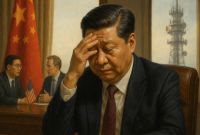Japanese Auto giants Honda, Nissan exit China amid recession

China's economy is facing a serious recession, and the wave of closures and bankruptcies of businesses in the country is accelerating. Recently, Japan's Honda announced its decision to close its factories and production lines in Guangzhou and Wuhan, signalling its withdrawal from China. A month earlier, Japan's Nissan Group also officially declared the closure of its factory and production line in Changzhou, cutting production capacity in China and planning to withdraw from the nation as soon as possible. Additionally, Nippon Steel Group recently announced the end of 20 years of cooperation with Baosteel and its withdrawal from China.
The exodus of leading Japanese, Korean, and Western corporations is pushing a large number of workers and unskilled labourers in China toward the risk of long-term unemployment. Unemployment and poverty are returning, and the Chinese economy is on a steep decline. Japanese companies leaving China will take away some industrial chains, making the unemployment wave in China even more chaotic.
Honda Motor Co. announced recently that it will close a factory in China and halt vehicle production at another amid fierce competition and falling sales in the mainland China market. Honda will shut down a factory operated through a Joint Venture (JV) with Chinese state-owned automaker Guangzhou Automobile Group in October. This plant, established nearly two decades ago, currently produces the Accord sedan and has an annual production capacity of 50,000 vehicles.
Additionally, Honda will suspend production at another factory in China operated through a separate joint venture with Dongfeng Motor Corporation. This plant has an annual production capacity of 240,000 vehicles. A Honda spokesperson stated that the company is facing difficult conditions in the world's largest auto market. As a result of the shutdowns, Honda's annual production capacity in China will decrease from 1.49 million vehicles to 1.2 million vehicles.
Previously, when Nissan Motor Group closed its latest assembly plant in Changzhou, it was a seismic event in a series of setbacks that Japanese automakers have experienced in an increasingly competitive market. Japanese car sales in China have dropped by 20% from their 2020 peak. Nissan and its peers have produced cars in large quantities in China since 2000 through local joint ventures. At one time, Nissan was considered more successful than Toyota Motor and Honda in the Chinese market. They poured resources into factories and dealerships, and Nissan's production output in China surpassed Toyota and Honda for ten years until 2018. The Changzhou plant was expected to boost sales further when it opened. China was Nissan's largest market for new car sales, surpassing the United States.
However, the price war waged by Chinese rivals has had devastating consequences. Nissan's sales in China fell by 16% to 790,000 vehicles last year, marking the fifth consecutive year of decline. Toyota's sales from January to May 2024 decreased by 10% year-on-year to 630,000 vehicles, while Honda's sales decreased by 17% to 340,000 vehicles.
Honda and Nissan are among the Japanese brands for which China has traditionally been a strong market. However, they are now being greatly influenced by the rise of low-cost domestic automakers. The competitive pressure from Chinese automakers, coupled with the economic downturn, has forced these Japanese companies to reconsider their operations in China.
The closure of factories and production lines by Honda and Nissan is not just a reflection of their individual challenges but also indicative of a broader trend of foreign companies re-evaluating their presence in China. The economic landscape in China is becoming increasingly difficult for foreign enterprises, prompting many to either scale back operations or withdraw entirely.
The withdrawal of these companies will have significant repercussions for the Chinese economy. The departure of Honda and Nissan will result in the loss of jobs and industrial chains, exacerbating the unemployment crisis in China. The ripple effect of these closures will be felt across various sectors, as suppliers and ancillary businesses dependent on these automakers will also suffer.
Moreover, the exit of prominent Japanese companies could signal a shift in the global automotive industry's dynamics. As these companies reduce their footprint in China, they may seek to establish or expand operations in other regions with more favourable economic conditions. This could lead to a realignment of global supply chains and manufacturing hubs.
The challenges faced by Honda and Nissan in China also underscore the broader economic difficulties confronting the country. China's export-driven economy is struggling with declining global demand, trade tensions, and internal economic issues. The closure of factories by major foreign investors highlights the urgent need for China to address these economic challenges and create a more conducive environment for business.
The decision by Honda and Nissan to close their factories and production lines in China is a significant development that reflects the broader economic challenges facing the country. The withdrawal of these companies will have far-reaching implications for the Chinese economy, including increased unemployment and disruption of industrial chains. As China navigates this period of economic uncertainty, it will need to address the underlying issues that are driving foreign companies away and work towards creating a more stable and attractive environment for investment.




![From Kathmandu to the World: How Excel Students Are Winning Big [Admission Open]](https://nepalaaja.com/img/70194/medium/excel-college-info-eng-nep-2342.jpg)
